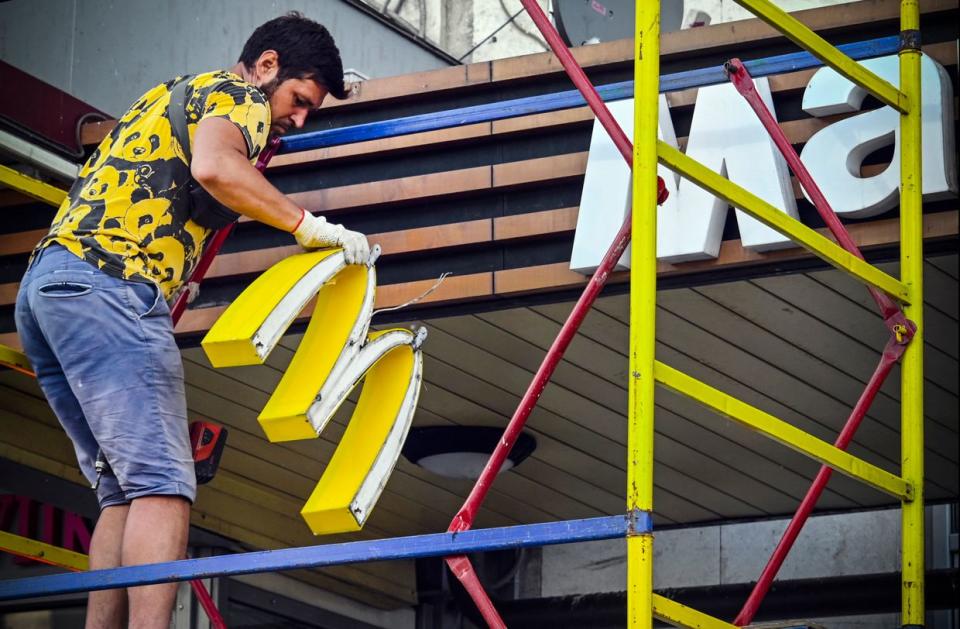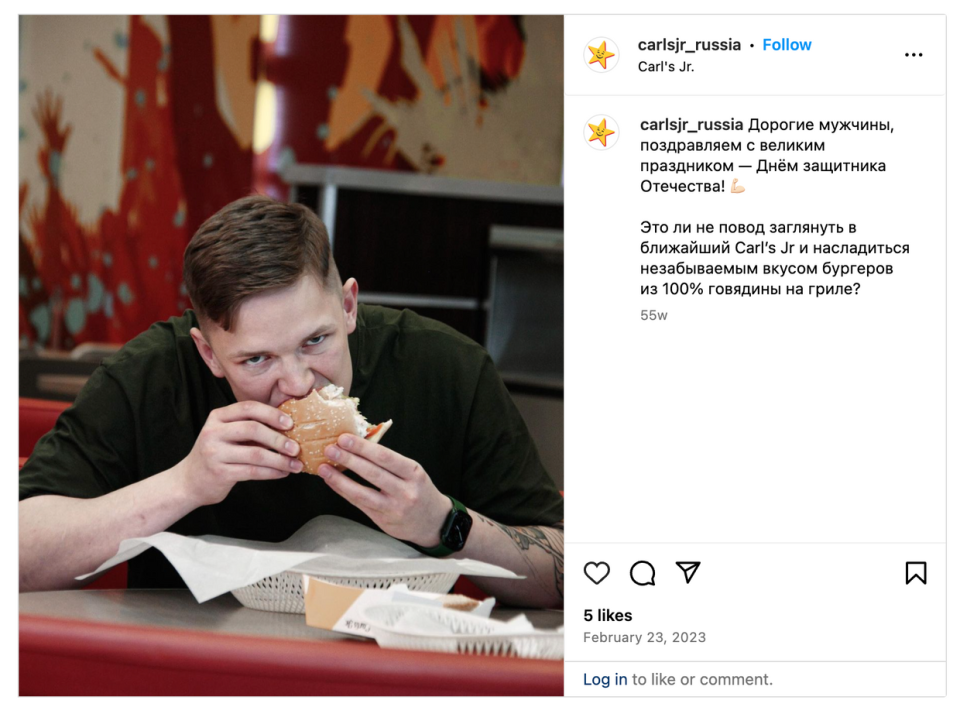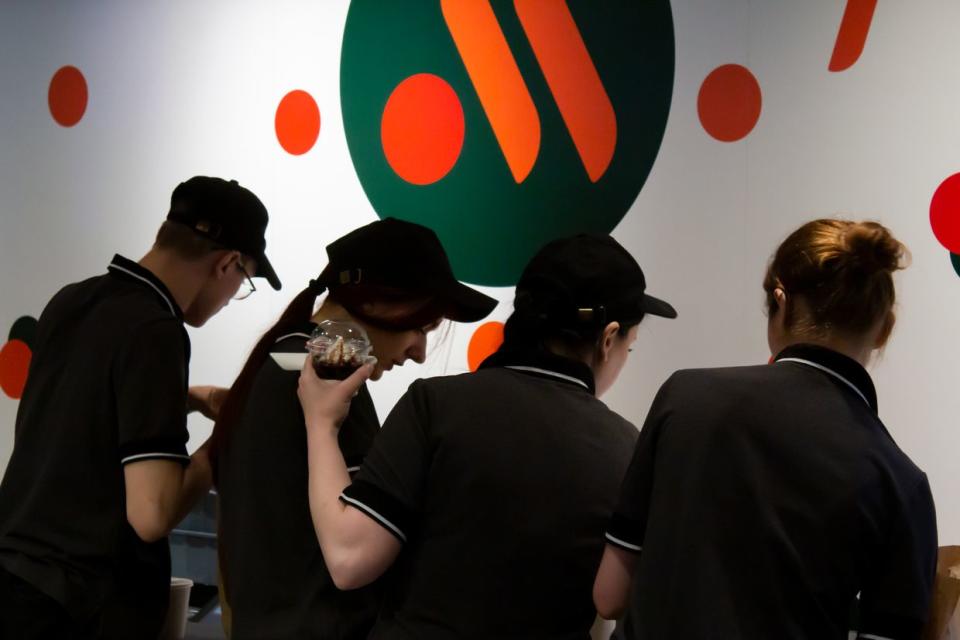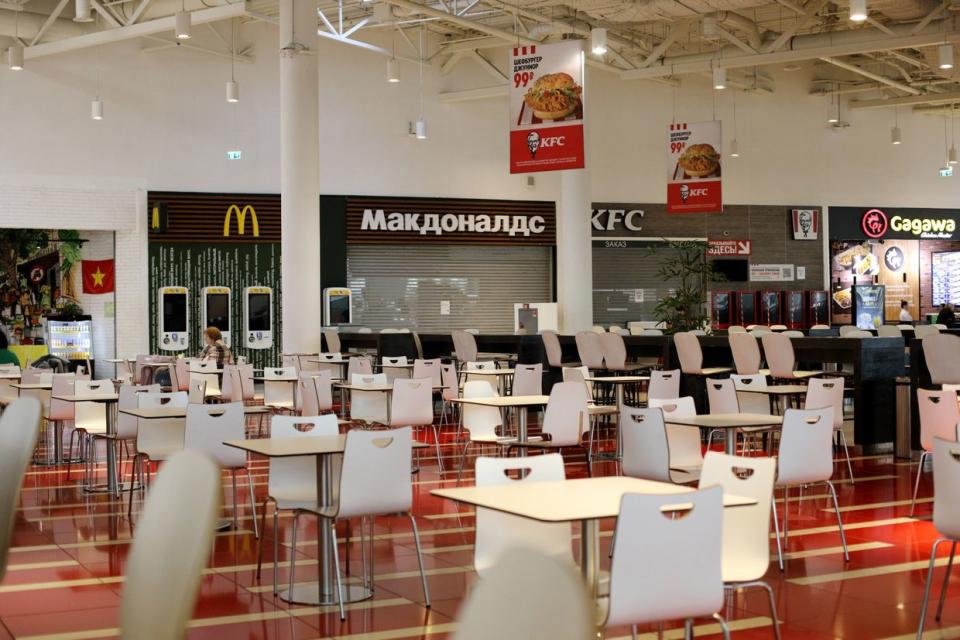Russians still enjoying American burgers and sandwiches as companies refuse to leave
After Russia invaded Ukraine in 2022, most major Western fast-food chains closed up shop, sold off assets, and exited the Russian market.
This was particularly true of the highly visible food sector. Major Western food and drink chains, including McDonald’s, Domino’s Pizza, Starbucks, KFC, Pizza Hut, Hard Rock Cafe, and the Jamie Oliver Group, have all since left Russia.
A small cohort of six American fast-food chains decided otherwise. The franchises of Subway, Carl’s Jr., Papa John’s, Costa Coffee, Burger King, and TGI Fridays have continued to operate, business as usual.

Of these six, Subway and Carl’s Jr. boast a unique accolade — they are the only Western food chains to never have stopped advertising on their Russian Instagram accounts at any point since the start of the full-scale invasion, actively marketing non-stop to their 20k and 6k followers, respectively.
Subway’s advertising and continued business in Russia landed it on one of Ukraine’s most ignominious lists, the International Sponsors of Russia’s War, in January of this year.
The companies claim that since their brands are operated independently by master franchisees in Russia, they have little control over the brands’ activities in the country, which includes their local Instagram pages.
Subway and Carl's Jr. have a long history of operating in Russia since the collapse of the Soviet Union. Experts say these companies may be hiding behind their franchise models to carry on with their more-than-30-year-old business in the country.
While the war on Ukraine has raged on, Carl’s Jr.’s advertisements on Instagram have featured scantily clad women eating the chain’s burgers, while other posts on the social media site have engaged in Russian nationalistic rhetoric.
A post on Feb. 23 for Russia’s Fatherland Day — a major celebration of Russia’s Armed Forces and veterans reads:
“Dear men, congratulations on the great holiday — the Defender of the Fatherland Day! Isn’t this a reason to pop into your nearest Carl’s Jr?”

“Bafflingly, (Carl’s Jr) not only still does business in Russia after vague reports of possible withdrawal, but is proud of it, posting Russian-language Instagram advertisements featuring striking Russian models feasting on American fast food as if there was nothing out of the ordinary,” Professor Jeffrey Sonnenfeld from the Yale School of Management told the Kyiv Independent.
“It is inexplicable that Carl’s Jr and Subway are still actively advertising so flamboyantly 20 months into the invasion when 1,000 plus global peers have left.”
Blame it on the franchise
Subway, part of Doctor's Associates Inc. —a private corporation recently bought by Roark Capital in 2023 from the highly secretive DeLuca family — has some 446 local franchises in Russia.
The sandwich maker told the Kyiv Independent that because it has “no corporately owned restaurant operations in Russia,” all of its restaurants are “independently owned and operated by a master franchisee, an independent U.S.-company called Subway Russia.”
“Subway (HQ) does not directly control these franchisees, nor their restaurants, and has limited insight into their day-to-day operations, and that it’s Subway Russia that “manages all operations, marketing, social media accounts, and the supply chain,” the company said.
Focus Brands — an affiliate of Subway’s owner, Roark Capital, who owns Cinnabon and other big names — still has around 200 cafes operating in Russia.
Meanwhile, Subway HQ added that it “is committed to not making any direct investments nor opening any company-owned restaurants in Russia. (We) remain committed to supporting humanitarian organizations with profits from operations in Russia going to (NGOs).”
Carl’s Jr. did not respond to a request from the Kyiv Independent, but the food chain’s parent company CKE Restaurants Holdings told CNN in July 2023 that all 17 restaurants in Russia are also franchised, and therefore independently managed by the master franchisee, adding that it has no control over Carl’s Jr’s Russian Instagram page.


CKE Restaurants has not donated any money, or profits from its Russian franchises, to humanitarian efforts, or if they have, they have made no public announcement about it.
Sonnenfeld disputes the companies’ claims that Subway and CKE have no control over their brands under a franchise model.
Even if a business has independent franchises operating in Russia, the parent company of food service businesses like Subway and Carl’s Jr. usually retains ultimate control over the use of its brand, logo, and other intellectual property in marketing, he said.
“I think the franchise smokescreen excuse reflects a lack of will, not a lack of viable options for moving forward.”
On the other hand, it is impossible to know with certainty without being subject to the contents of Carl’s Jr. and Subway’s master franchisee contracts in Russia, said Maximilian Hess, a fellow at the Foreign Policy Research Institute, and author of the recently published book “Economic War: Ukraine and the Global Conflict Between Russia and the West.”
But it would be unusual for these contracts to allow the master franchisee unfiltered control of Carl’s Jr. and Subway’s brands, particularly on international social media sites, said Hess.
“It would also be very odd for these contracts not to contain exit clauses. But these would likely incur serious costs to the Carl’s Jr. and Subway parent companies. So it’s pretty much a strategic calculation about whether the reputational risk to Subway/Carl’s Jr is more costly to their bottom line than paying for a break clause.”
If these firms refuse to accept the costs involved in ending their franchise agreements in Russia, it casts serious doubt on their supposed commitment to supporting the people of Ukraine victimized by the war, said Hess.
Of the six Western fast-food chains still in Russia, all of which operate with franchises, only Carl’s Jr and Subway have continued to advertise across their Russian Instagram since the invasion of Ukraine.

Burger King, the largest brand among these six, halted all activity on its Russian Instagram page (which has 81k followers), as of March 8, 2022. It did so despite being owned by multiple master franchisees, one of whom, a local Russian businessman, Alexander Kolobov, refused to shut down Burger King’s 800 stores in Russia. The restaurants are still running to this day.
RBI, Burger King’s parent company, said in a public statement in March 2022 that it “suspended all of its corporate support for the Russian market, including operations, marketing and supply chain. (But) we have long-standing (franchise) legal agreements that are not easily changeable, (meaning we) cannot simply pull the plug on those restaurants, as other brands, including McDonald’s, have done in Russia.”
Unlike companies using the franchise model in Russia, McDonald's corporately owned its restaurants, thereby giving it full and direct control to more easily divest from Russia, as the chain did in May 2022.
This is why Papa John’s finds itself in a similar position to Burger King. Its master franchisee for Russia (a company owned by U.S. citizen Christopher Wynne’s) has refused to shut down its 190 restaurants since, “at the end of the day, (Russians) appreciate a good pizza,” Wynne told the New York Times.
And yet even Wynne’s Instagram page for Papa John’s (which has 19k followers) stopped posting on March 11, 2022, after making a public anti-war statement (only then to recommence eight months later).
Subway and Carl’s Jr.'s unfettered business dealings in Russia is likely connected to the companies’ master franchisees: the Subway Russia Franchising Company LLC (“Subway Russia”) and the Nevada Russia Franchising Company LLC. Both are American companies registered in the state of Nevada.
The two entities are run by the same core team: U.S. businessmen James Gansinger, Steve Brown, David DiTomaso, and David Worrel, veterans in the global franchising industry, particularly the post-Soviet Russian market.

Cowboy franchise model in post-Soviet Russia
All four businessmen achieved great success in setting up Subway’s hundreds of Russian restaurants, a story that starts in the early 1990s, right after the breakup of the USSR when few knew what to expect when they crossed the newly lifted Iron Curtain.
At the time, a $750 million financing package had been agreed by then-presidents Bill Clinton and Boris Yeltsin. The intention: to stimulate investment in Russia. It was a huge success, and by the mid-1990s, foreign investors were closing deals at the rate of half a billion dollars a month.
Gansinger and company were part of this wave of investment, as explained in a 2004 interview with the San Fernando Valley Business Journal (SFVBJ). “(I) went to see (the first) McDonald’s near Pushkin Square (in Moscow), and there was a line that went all the way around the block. It was astonishing.”
Inspired, Gansinger — a litigation attorney in California — began rolling out Russia’s very first Subway, as the master franchisee. To do this, he and his team needed a local partner, like all foreign companies doing business in Russia at that time. It was through a contact of Boris Yeltsin himself that he found the right person for the job, one Vadim Bordug, according to SFVBJ.
As Gansinger and Co.’s joint partner, Bordug helped identify the right site for the first Subway, which opened in December 1994 in St. Petersburg to the tune of $2.5 million, SFVBJ reported. With Russians hungry for American sandwiches, the 150-seat branch was a huge success, and would go on to become Subway’s best-selling branch, globally, in the 1990s.
But shiny objects attract attention, in this case, the eye of the Russian mafia.
And so, just seven months after cutting the red tape, Subway’s first Russian branch fell under the control of St. Petersburg’s notorious Tambovsky gang, who had links to corrupt Russian officials. Fingers were pointed at Bordug.
“The mistake we made was that we assumed that, since this guy came to us as a direct referral from the president’s office, that was all the vetting we needed to do,” Gansinger told SFVBJ.
Whether it was Bordug or not, the result was a, quite literal, guns-out takeover of the Subway restaurant on a day when its American manager, the aforementioned Steve Brown, was holidaying in Turkey. When Brown returned to the site, which had new door locks, he was beaten up on the spot by thugs.


The ordeal, a gang of hardened Russian mobsters hijacking a U.S. sandwich bar, was brought to the attention of, none other than, the FBI, who advised Gansinger and his team to avoid negotiating with the mafia group directly.
As such, Gansinger went to the International Arbitration Court in Stockholm where he represented himself in court. He also met with Vladimir Putin, who was then deputy mayor of St. Petersburg. Meanwhile, Brown (and his wife) received death threats and Gansinger frequently had to travel under a fake name for self-protection.
After more than eight years of legal wrangling, as well as political intervention by both the U.S. government and the Russian government, Gansinger won back control over the branch in both the international and Russian courts and against all the odds since dozens of other foreign companies in 1990s-Russia faced similar mafioso attacks (including bombings), only to walk away and flee.
When the case was finally concluded, Subway Russia was the first company in post-Soviet Russia to benefit from a successful foreign arbitration process. “We just basically refused to let the crooks get away with what they tried to do,” Gansinger told SFVBJ.
Over the coming decades, Gansinger and company went on to roll out some 700 stores across Russia (at its peak), becoming for many years the largest franchisor in all of Russia, ahead of McDonald’s.

Naturally, he and his founding team remain proud of their tenacity and success in creating a little empire of Russian Subways, which is currently worth some $60 million.
It was with these decades of experience that Gansinger and Co’s Nevada Russia Franchising Company became Carl’s Jr’s master franchisee in mid-2021, at which point the two groups have agreed to develop 300-plus restaurants throughout Russia over the coming years (up from just 17 today).
It has yet to be made public whether these plans have now been abandoned. Neither the company, nor Gansinger, Brown, DiTomaso, and Worreldid, responded to the Kyiv Independent’s queries.
Despite the costs involved in leaving the Russian market, which have only increased as Russian President Vladimir Putin has begun policing sell-offs, hundreds of companies have taken the hit of leaving Russia with nothing or selling at a discount.
But little seems to dull the ambitions of Gansinger and Co. as they continue to fly under the cover of their franchise agreements.
Read also: Investigation: Leading Polish fashion retailer fakes exit from Russian market
We’ve been working hard to bring you independent, locally-sourced news from Ukraine. Consider supporting the Kyiv Independent.

